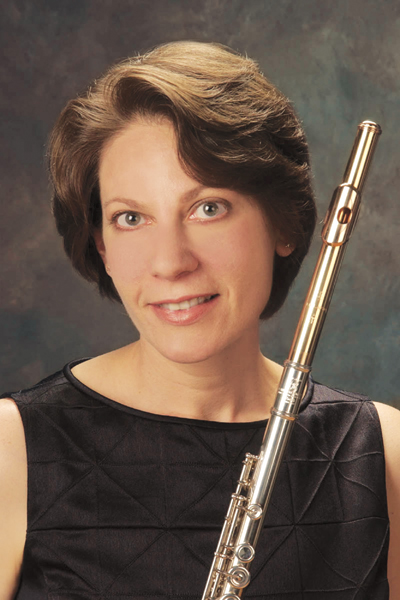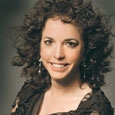Francesca Arnone has performed in orchestras in varied parts of the world. Now as a flute professor at West Virginia University, she brings this love of musical exploration to her students. “I think it’s critical for students to hear other players from different programs and countries. It’s a revelation because they can get stuck in their own world.” She also introduces her students to teaching and provides the opportunity for them to assist at a summer high school flute camp.

Education
Arnone got her first experience playing flute at age eight. At the private school she attended, all the students played in band. “I wanted to play the clarinet because a friend of mine played it. My parents, however, bought me a used flute for $50. It took me two weeks to get a sound, but I stuck with it. One day it clicked, and I finally figured out how to aim the air stream.”
A year later Arnone was playing in Port Charlotte’s community band where she sat alongside seasoned musician Harry Collette, a retired jazz and big band saxophonist from Detroit. Collette happened to be in the process of learning the flute and gave Francesca her first private lessons. “We were basically learning together. He also had me play in the community pops orchestra beside him.”
As a senior in high school she studied with Kenneth Scutt, who had just retired from the Associate Principal position in the Philadelphia Orchestra. “Mr. Scutt was very intimidating to me. He had studied at Curtis with Kincaid and Tabuteau. I wanted to pursue music, but he thought that, although I had potential, I was starting too late. I think he was frustrated with how much work had to be done. It was palpable to me as a young student how far behind I was, and this created a lot of difficulty for me.” Scutt suggested that Arnone consider Florida State instead of Oberlin, the school on which she had set her sights. “Just to be difficult, I didn’t even apply to Florida State. I’m sure I would have gotten tons out of Charles Delaney, but in my immature way, I was drawing a line in the sand as well as challenging myself.”
Arnone auditioned at Oberlin, was accepted, and studied flute with Robert Willoughby and Julia Bogorad-Kogan, and traverso with Michael Lynn. “Of primary importance to Mr. Willoughby, was that he wanted us to be thinking musicians. He said, ‘I don’t care what you do, just do something and be able to tell me why.’ It was a powerful lesson. He taught me to always be musical and think about the phrase. I remember he often said that many times the most musical solution addresses the technical issues.”
After Oberlin Arnone was making plans to start work on her master’s degree at the San Francisco Conservatory with Timothy Day when she was in a serious car accident, hit by a drunk driver. “I was generally okay, but my left arm was shredded and my jaw hit the steering wheel – this was before airbags. I had to learn how to play again from square one, which is not how one wants to start a master’s degree. I was terrified to take time off from school. I wish I had done so though, so that I could have healed well instead of putting myself under extra pressure. It worked out in the end, but it was a lot of pressure and work.”
Playing Abroad
After graduating from the San Francisco Conservatory, Arnone stayed in town for about a year to freelance, build a teaching studio, and work as an administrative assistant for a chamber orchestra. An opportunity to make a rather large change came when a friend called her from Santa Cruz de Tenerife in the Canary Islands with the news that the orchestra needed a piccolo player. Arnone accepted the invitation, and with two years of high school Spanish under her belt, toured with the orchestra for four months. “I was so excited by this opportunity to learn new cultures and meet people through music.”
It wasn’t long before another opportunity arrived when she heard about an opening for second flute in a symphony in Mexico where she ended up living for almost four years. “I initially went to Mexico to play with the Philarmónica del Bajío, but that job only lasted three months because shortly after I arrived, there was an election and a complete reversal of government leadership that affected the orchestra. Afterwards, I played co-principal in the Orquesta Sinfónica de la Universidade de Guanajuato. It’s hard to believe that there are so many government-run orchestras in Mexico. We think of it as a third-world country, but in many ways Mexico is a leader in terms of orchestras and supporting the arts. I spent most of my four years at my last job, a tenured position at the Universidad de Guanajuato, which funded a full-time orchestra. The symphony was very good. We played concerts a couple times a week, performing huge repertoire, much of which I may never play again. It was a terrific experience.”
After several years Arnone moved to Florida where she started a private studio, and played in the Southwest Florida Symphony in Fort Myers. She also returned to school and received a doctorate at the University of Miami, studying with Christine Nield.
Teaching At West Virginia
After graduating from the University of Miami, Arnone went to Boise, Idaho where she played principal in the Boise Philharmonic for four seasons and taught at Boise State University and Idaho State University in Pocatello. In 2006 she took the position of Assistant Professor of Flute at West Virginia University, where she has a private studio of both undergraduate and graduate students.
“I believe that students have to get the mechanics down because this leads to freedom. I did it backwards when I was a student. I focused on the music first, and then later I finally accepted that my technique was a liability. If I had myself as a young student, I would probably think that she is just not ready to see the light and accept that this is the path that has to be taken to find success. Now I can truly understand my own teachers’ dilemmas! It is sad to hear a student play the repertoire’s largest and most important works without musical awareness and technical development united.”
For students who might not be ready to accept a program that includes diligent work on preparing the basics, Arnone has subtle ways of helping them into the process. “Sometimes, if they are really serious, I think the best thing to help those students is to surround them with their peers from other places or have them go to festivals so they can see what’s out there.
“Having a strong technical foundation is just the start, however. I try to give my students direction in finding their musical personalities and let them know that everyone is distinctly different. Through music they should learn how to solve problems and about themselves, instead of focusing on meeting a required level or others’ expectations.
“Without getting too philosophical, my concern for students today is that they seem too focused on pursuing a degree in order to get a job and not on enriching themselves. Certainly paying the bills is critical, but I feel students are often missing the point of what we do as musicians.
“I try to ask students leading questions to solve problems at lessons. I don’t believe in giving them the answers. I want them to walk me through it. In their practice they should have a game plan instead of going through random acts of seeing what will happen when they practice. One way I do this is by having them write private, on-line journals on Blackboard [an online virtual classroom supported by various academic institutions] that I review. Weekly, I write a question that they have to address in written form. For example, I might use the prompt: ‘If I play with the metronome on off-beats instead of on the beat, I feel this helps me notice…”
Introducing Students to Teaching
“I try to keep my students interested in the flute by having lots of activities for the studio. We have different topics in weekly studio classes; I have them teach each other. It is informative for me too, to see them in action. Last year, for example, everyone was assigned two lyrical etudes to prepare and one to teach. Prior to the class, I hadn’t worked on them with anyone. They had to analyze and figure out what should be addressed and write a lesson plan. It was interesting to watch them teach and respond to each other. I also encourage students to transfer what they are learning in their music education classes to their flute playing, and then to connect all classes in the music curriculum. It should all come back in one happy circle.”
Students working with Arnone also have the opportunity to work at the high school flute camp that Arnone started in 2007. “At the camp, my students teach alongside me. It’s a lot of work for them, but it is so satisfying to see the studio come together and grow in this way. I try to make sure my students have plenty of opportunities. I believe that anyone who is a music major will be teaching in some capacity, so it is just smart to have them doing that in their college years.”
Each summer, Arnone invites noted guest artists to work with her students. Trevor Wye and Julia Bogorad-Kogan were visiting instructors over the past several summers. Masterclass artists during the school year have included Walfrid Kujala, Bernie Goldberg, Lorna McGhee, Aaron Goldman, and Jennifer Connor. “It was really fascinating to have Julia come back to do a seminar. It was very satisfying for me to see her work with my students. I think my students could see where I inherited a lot of my ideas, especially my tone-based ideas of having a more open sound. ‘Drop the jaw’ and ‘air in the cheeks’ have always been hot buttons for some people.
In general, she works with a much lower top lip, more open inside of the mouth, and focuses the airstream down a lot more.
“I also worked a lot with Trevor Wye. For two summer sessions I was a participant at his masterclasses, and then he offered two summer seminars at my school. I feel that he helped me fill in a lot of holes that I had accumulated in my playing, and some that I didn’t know were there. I hated practicing technique because it seemed like a repetitive, mindless activity. One of his ideas was to never play the same thing two days in a row. To me it’s like working out with weights, alternating muscle groups and not doing the same exercises daily. Many times I just come up with an exercise off the top of my head and do it in different keys, thanks to Trevor.
Final Thoughts
“I thought many times that I wouldn’t be a flutist. I loved playing, but I hadn’t tapped into what I thought I could do best or be the most useful to people. I love all the different hats I can wear in academia – teacher, performer, mentor, writer, idea-person, and so on. I enjoy playing and performing, but working with others to help them create music and find meaning in music is for me a far more important musical experience than being on a stage. I guess the key is to stay passionate about what music means to you and never lose sight of that.”





